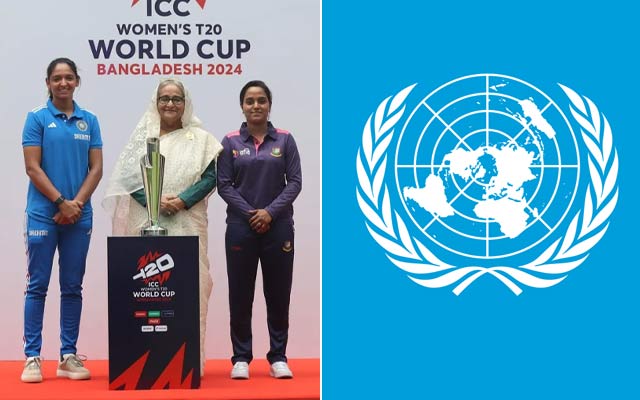The Bangladesh Cricket Board (BCB) is making concerted efforts to retain the hosting rights for the upcoming Women’s T20 World Cup, despite increasing uncertainty due to recent political turmoil in the country. The Bangladesh government is also making last-ditch attempts, including seeking support from the United Nations (UN), to ensure the tournament remains in Bangladesh.

On Saturday, the ICC informed the participating boards that it is still monitoring the situation in Bangladesh and that it will consider all options, including moving the tournament elsewhere with considered alternative backup venues in the United Arab Emirates, India, and Sri Lanka for hosting the tournament. As it stands, the governments of Australia, the United Kingdom (England and Scotland), India, and New Zealand have issued travel advisories for their citizens traveling to Bangladesh, either asking their residents not to travel to Bangladesh or discouraging them from doing so.
In light of these developments, BCB CEO Nizamuddin Chowdhury, along with seven other board directors—Akram Khan, Jalal Younus, Mahbub Anam, Khaled Mahmud Sujon, Ahmed Sajjadul Alam Bobby, Kazi Inam Ahmed, and Iftekhar Rahman—met with Asif Mahmud Sajeeb Bhuiyan, the newly appointed adviser of the interim government for the Ministry of Youth and Sports, on Sunday. This meeting highlighted the need for initiatives from both the ministry and the BCB to negotiate with participating countries on security and other critical issues, as Bangladesh prepares to host the upcoming T20 Women’s World Cup from October 3 to 20 in Dhaka and Sylhet.
The unstable political situation has cast doubt on Bangladesh’s ability to host the tournament. The BCB faces challenges following the unrest triggered by student protests against the recently dissolved Sheikh Hasina government, with board president Nazmul Hasan currently in hiding along with several other board directors. Despite the unrest and the resignation of Prime Minister Sheikh Hasina on August 5, the BCB has sought security assurances from the Army Chief to retain the hosting rights. Meanwhile, other influential board directors are working to normalize the situation, continuing the BCB’s regular activities, and taking steps to ensure Bangladesh can successfully organize the 10-team tournament.
To place your bets and earn real money, click on the image and sign up now:
The uncertainty surrounding the World Cup arises amidst a major crisis within the BCB itself. The board’s president, Nazmul Hassan, who also served as the former sports minister, has been missing since the Awami League government fell on August 5. Additionally, several directors with direct or indirect political ties are also currently untraceable.
Asif Mahmud Bhuiyan Sajib, the Youth and Sports Ministry adviser for the interim government, previously voiced optimism on August 10th about successfully hosting the event in Bangladesh. Sajib, a key figure in the anti-discrimination student movement, pledged that the Ministry would take all necessary steps to ensure the World Cup proceeds as planned. On Sunday, he discussed ongoing preparations, emphasizing the critical importance of security. He acknowledged that there is still work to be done in this area and plans to discuss the matter further with Dr. Muhammad Yunus, the chief adviser of the interim government and a known sports enthusiast.
Mahmud expressed confidence in providing foolproof security, despite travel-related restrictions from some countries, and noted that a few infrastructural issues need to be addressed, with assurances from the honorable secretary that these will be resolved in time. In the absence of the board president, the BCB directors will handle the situation according to ICC guidelines, including making any necessary interim recruitments.
Asif also added that he will speak to the UN about the countries that have put out travel restrictions on their citizens traveling to Bangladesh. The BCB considers this as its biggest barrier to the hosting of the tournament. Travel bans or restriction announcements can only be lifted by the respective governments, and cricket boards have little influence over them.
Asif mentioned plans to discuss these issues, along with concerns about security and infrastructure, with Professor Yunus, the chief adviser to Bangladesh’s current interim government. Mahmud expressed hope that, given Yunus’s passion for sports, he could help resolve these matters.
Asif Mahmud expressed concern over the absence of the BCB president, acknowledging the challenge it poses to the proper functioning of the federation. He recognized the board’s need for autonomy in its decision-making but emphasized that the directors have been advised to seek solutions within the ICC’s legal framework. Instead of merely replacing individuals, the focus is on implementing systemic changes to create a corruption-resistant structure that ensures a long-term solution.
Asif Mahmud stressed the need for reform within the BCB, highlighting that despite gaining Full Membership in 2000, significant progress has been limited primarily to infrastructural development. He pointed out the BCB’s lack of ownership of a cricket ground and the shortcomings in planning and execution. Despite the extensive experience of many BCB officials, some of whom have been involved for 20-30 years, he expressed disappointment in their failure to deliver meaningful improvements.
(Inputs sourced from ESPN cricinfo & Dhaka Tribune)
